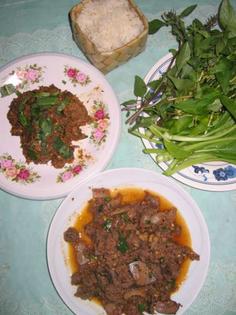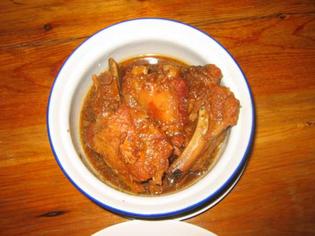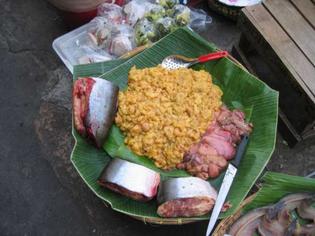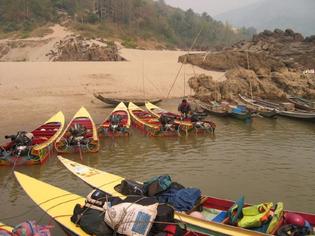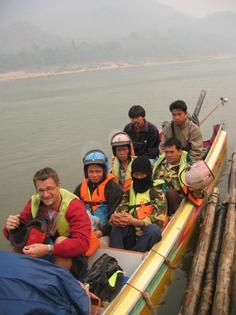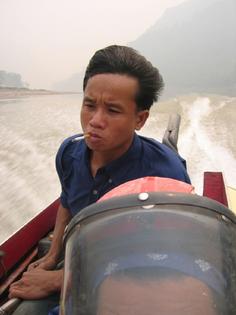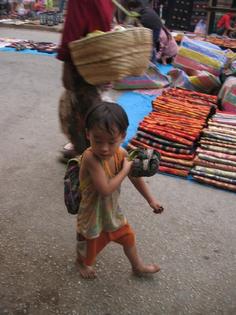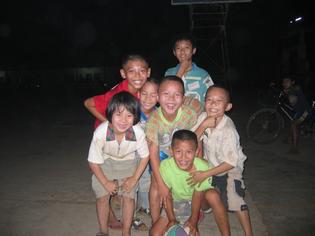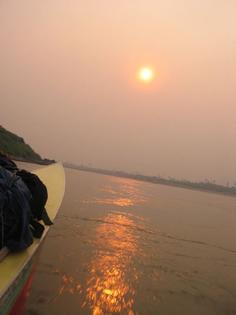June 26, 2004
RED ANTS, WRITING, AND CHIANG MAI
Writing, like cooking, gets its fair share of impostors. Seems like the world
is full of people in other professions wanting to write a novel or open a
restaurant. Is it about glamour, riches or just the need to express themselves?
As a chef, I've met many a food writer and a handful of critics. It's a
precarious relationship, each understanding the necessity of the other, but
beneath the coddling, a secret loathing stews. The good food writers are, at
minimum, novice cooks, which enables them to see through the illusion of the
grand chef. The infallible chef, however famous, still rides the wave created
from the pen of the insoluble writer. One envies the glory, the other the
freedom. As they rise, their careers meet in the glorious worlds of television
and publishing, turning their talents to more profitable endeavors and finding a
certain agreement at that level. I've spent most of my career on the fringes,
just enjoying the crumbs and festering in the evils of not being chosen.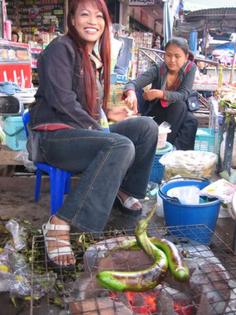
My foray into writing is pure happenstance. But, three months into this trip I’ve found it to be an exhilarating experience. Like cooking, it is both craft and art. It involves the wonderful blend of history, structure and imagination. As I struggle to keep the entries of this site coming, I have developed a new appreciation for writers; it is lonely and often times maddening work. Food is tangible. You may not know what to do with it, but at least you can see it, smell it, snack on it. Writers aren't quirky because of some genetic disposition, they’re just clogged up with "walk-in"-sized information logged in their heads. As I plow through my notes in several languages, trying to recall the nuances of conversations and flavors from weeks ago, I've begun to sympathize. It's made living in the-here-and-now hard. The real trouble for me is that I eat and travel faster than I write. The result though, like unveiling a new spring menu, is complete satisfaction. Extricating your thoughts onto paper is liberating and it feeds that inflated sense of self-importance; a trait likely to be found in both chef and writer. I approach the task of writing in the same way that I cook: a loose recipe, a sifting through more mise en place and notes than necessary in the attempt to deliver a distilled vision, where clarity of flavor/thought and whimsy are in harmony -- an Elvis Costello-ish song minus his new found vibrato.
After Laos, I knew I needed to find a place to hunker down, to regurgitate the arcane experience I just had. In Chiang Mai, I settled into a comfortable guesthouse on the front end of the old city. What a strange mix of people inhabiting the ancient walls along Thanon Mun Meuang: old-school hippies hanging out in vegetarian restaurants waiting for their meditation class to start, professors teaching in the nearby university attempting to sell books at one of the many used book stores, young monks scouting out the wonderings of eager backpackers (females especially) and classless ex-pats cruising on Harleys with 80 pound Thai girlfriends strapped to the back.
Nearby was a library run by UC Berkeley. I spent my afternoons there, writing, getting wired on Thai ice coffee and walking barefoot on the polished stone courtyard. For lunch, I snuck off to one of the many suggested restaurants, which were a composite from the food writers who comb the world for treasured eating. One day, I had Red Ant Egg soup with Pak Waan, leaves from a tree that grows wild. Both the ants and the leaves are found in March, right before the rainy season begins. The simple marriage of flavors in a light broth and the last second sprinkling of fresh herbs reminded me of Vietnam. Northern Thai food is less dramatic than that of the south; bold in style, the flavors are more concentrated, like the hot and sour salads I had at Si Phen one day: Yam Pla Duc Fu, a catfish salad pounded together in a mortar and pestle with charred shallots, garlic, lemongrass, chilies and sour tomatoes. Its spiciness was deliberate and focused -- different from the colorful and acrobatic foods of the warmer climates. I also had Lap Moo, a salad of pork, featuring its kidney, liver, skin and fried ground pork butt. The deep frying of meat in its fat is a critical characteristic of the north, deriving the flavor from the ingredient, rather than the seasoning. I loved the use of fermented fish, shrimp and crab -- its salty skunk imparting such defining flavors.
Through my friend Rob Mckeoen, a splendid food writer and correspondent
for Gourmet Magazine, I found this incredible restaurant down by the Mae Nam
Ping river. The father, mother and daughter team were interchangeable, but all
seemed to prefer cooking. Unable to read the Thai menu and not trusting that the
one in English was the same, I asked the daughter to just make a few of her
favorite dishes: steamed serpent fish with fried shallots, shards of dill and
basil, and an exquisitely light curry sauce -- absolutely the best fish I'd
tasted in SE Asia thus far, still on the bone and perfectly steamed. All three
peered out from the kitchen, awaiting my approval and I gave it with the tilt of
my head. Then, came slow cooked pork ribs; their steam carrying the aromas of
star anise and soy. The meat was limp with moisture as it fell from the bone. I
thought I was back home, eating Tom Valenti's food, a man that could braise your
shoe and it would probably taste good. The broth was made by slowly caramelizing
shallots and sugar, a sweetening technique I saw in Hanoi. The mingling of
spices and rich pork stock was awakened by a few hits of finely minced fresh
chilies. On the way home, I walked through the legendary night bazaar, thousands
of stalls selling the same t-shirts, wood carvings and fake hill-tribe costumes.
Though totally full, I settled down at a table to do what everybody does in the
spring, eat sticky rice and mangoes: the heavenly mixture of silken coconut
cream, succulent mango and chewy sticky rice. I was ready to roll over and die,
but I hadn't written about it yet.
On other evenings, I'd run; each night picking a different area of town, in hopes of catching a glimpse of the many old temples, shrines and lanna-style buildings that make up Chiang Mai. It's a glorious city and as I run, my mind becomes lucid releasing a floodgate of thought. If I could record the prolonged stories and vivid imagery that occur while running, it would make writing much less lethargic. Is it that your mind is sucking in more oxygen or that there's a heightened level of adrenaline being produced? Whatever it is, I wish I could see things that way all the time. It's like being at the Ziegfield: a cinematic experience with the clarity of real life, but with the ability to take you backwards and forwards in time simultaneously. By the time I'm back stretching, I’ve forgotten everything.
I befriended a handful of people in Chiang Mai: an American writer who
was working on a book of Laotian folk tales, a young girl from Seattle teaching
English in a village further north and a few monks, who somehow knew all of us
from different acquaintances. We shared stories and thoughts over meals and tea.
I found my week in Chiang Mai to be grounding, like I had been living there for
awhile. It reminded me of a college town with a built-in transient population of
intellectuals, students and hangers-on. I'm always inspired by that sort of an
environment -- one with contemplative worldly types that have the luxury to mull
over the "greater" concerns of life: religion, philosophy,
art...literature.
June 14, 2004
SPEED BOATS AND BASKETBALL
There aren't any roads from Laung Prabang to Huay Xai, so for backpackers attempting to travel to Thailand you have two options. For the thrill seekers, there's the speed boat, 350 kilometers in 8 grueling hours. For those preferring a slower form of torture, there's the sluggish two-day boat, which cruises at walking speed and stops half way for a good night’s sleep. It wasn't a difficult decision for me.
The alarm clock went off at 5:00 am, my eyes bloodshot from a night of rice whiskey and cheap cigarettes. I gather my things and hail a motorbike. If you can fit an entire family on one, you certainly can carry a skinny Asian and his luggage. We head off for the Ban Dan boat landing, passing a slew of school kids on bicycles and trucks bulging with vegetables heading for the markets. The rush of fresh air peels my eyes open as I said goodbye to a country I had fallen in love with.
It wasn't much of a landing, just a cliff with an old staircase leading down to a muddy river bank. The hut-like ticket booth was closed, but the noodle shop across the dirt parking lot was busy with the other fools that heeded the warning of "6:00 am sharp". I skipped the coffee and had some fish ball soup. Between bites, the shop owner pestered me into buying ear plugs, a rain jacket, sunglasses and a local paper. We all waited patiently; by now, everyone understood the LLB (Laotian-Laid-Backness). About 7:00 am, a few drivers showed up and 30 minutes later, the lady that ran the boats. She promised we'd leave in 15 minutes. An hour later, they took the first eight of us, being the last picked, I felt lucky. We piled into the boat and it practically sunk -- the water was inches away from the top and as we began to move, it sloshed its way in, soaking our bags and feet. The driver shouted to the remaining people up in the ridge and a young couple happily scurried down. I'm not big, but in Laos I'd be a power forward. Two other heavies were removed and we headed back up the hill, feeling dejected.
While waiting for five more candidates to fill another boat, I began conjuring up images of the storied Mekong River; its mysterious waters, which meander from Tibet and down through China, Thailand, Laos, Cambodia and Vietnam to rest in the South China Sea. It has divided and united countries and peoples for centuries. Its imperceptible flow somehow makes you feel like the real story has yet to be told. All around, the ripe smells of vegetation and river life played with your senses as my thoughts somehow morphed into images of the first boat crashing against the angry cliffs that reach down to sip from the mighty river. I saw the "lighter" people clutching their belongings, drifting futilely as they slowly disappeared one by one into the silt that lay below. We just passed peacefully by, wondering, why them? Who were they? And, why had they come to Ban Don to be the first eight chosen? The “Sweet Here After” river version.
Finally, we pile into the boat fitted with helmets, life jackets and wind breakers. Our driver lights a cigarette, then fires up the Toyota engine mounted at the stern. He dips the long pipe-like propeller into the water and we’re off. It's exhilarating, but so loud my ears scream with pain. I clamor through my bag and find the earplugs. A sheet of water sprays up from the bow and I redirect it, dousing myself and my Canadian friend. At 30 miles per hour, just breathing in the slipstream of air can be difficult. The first hour was great -- the 20 feet long narrow boat sped through the water like a jet, blurring all that we passed. How our driver managed to smoke was much less perplexing as his seeming ability to navigate through the jagged rocks, some hiding just inches below the water’s surface. After an hour, my lower back begins to stiffen. I try to wiggle, but realize that any sort of repositioning is out of the question. My knees are packed up into my chest and sandwiched between the Canadian and the side walls. We're sardines, minus the oil. We weave around iceberg-shaped rocks, passing little vignettes of life: fisherman sifting through their nets, young girls gleefully washing clothes and pockets of huts resting upon slender stilts. Our engine begins to sputter, then gives way to a chug and finally silence. The driver lights a cigarette pops open the clutch and pulls a paper clip from behind his ear. I slip on my headphones to find Tool still playing from a previous trip. It seems appropriate, though I'm not sure why. For the next two hours, the boat breaks down a dozen more times; we stay amused by watching the Laotian fellas piss -- it's like hangin’ out at a pub, either they have small bladders or they’re marking uncharted territory.
We'd only traveled about 80 kilometers when the speed boats going the opposite way toward LP started passing us; from my calculations, we were about 5 hours behind schedule and probably not going to get to Huay Xai in time to cross over into Thailand. I had planned to travel all the way to Chaing Rai in hopes of venturing up into the Golden Triangle the following day. I was convinced now that just getting across the border and back into Thailand would be fine.
As the day progressed, the complete compression of my body resulted in the
loss of feeling in my lower half. I tried not to think about it, but my head and
back were throbbing. I imagined jumping over board, feeling the water tingling
my nerves. I contemplated asking to stop to just let me off, but I figured the
prolonged torture of being stuck in the middle of nowhere might be worse. I
tried breathing exercises, meditating and finally acupressure: digging my thumbs
deep into the apex of my jaw and holding them there as long as I could. It
actually helped. Life on the river enlivened as we passed into the late
afternoon. Entire villages gathered on jetties, fishing as the sun began to
wane. The smell of fires filled the air and a stream of insects pelted my
cheeks. The villages looked haunted under the gloomy canopy of the darkened
forests.
We stopped to let a few of the guys off, but before we could
spread out, two more climbed in: one hobbling on a severely wounded foot. I
could smell the wound as it oozed a yellowish puss out onto the floor of the
boat. His friend tried hard to keep him from passing out, as we now made our way
up the river to a nearby hospital. My pain and discomfort gave way to a concern
for his well being and, for a moment, I thought I might be human after all. When
we arrived at the hospital, he had fallen unconscious. As his friend attempted
to carry him off, the boat our driver insisted that they pay -- rules of the
river.
With night descending upon the Mekong, we spent the last of our now ten hour trip guided by the lanterns along the banks. My hopes of reaching Thailand were now fully thwarted, so I quietly wished for somewhere to stretch, eat and drink. We arrived in Huay Xai, the Laos border town that lay across the river from Thailand. The eerie night was interrupted by the blaring of Thai pop music from the bar-restaurants in Chiang Khlong. It was like the country was laughing at me. We gathered our bags, which were drenched in river stink and headed up the embankment for town. Reaching the top, we're met by a throng of hopeful jumbo drivers grabbing at our bags. It's so lovely to feel wanted. Splitting the fare with the Canadian, we bounce our way over the potholed road and through the town, passing a group of kids playing basketball under a flickering streetlight. I took the first guest house I saw and tossed on my tennis shoes. As I approached, the kids seemed puzzled. Without my speaking to them, they must have thought I was a really dumb local or a Japanese tourist. We played late into the night until someone’s mom came to fetch them. I dominated the game, towering over them like Kevin Garnett. Of course, the oldest kid there was about eight. By the end, I had forgotten the day in the swish of a shot -- just feeling happy to still be in Laos. We parted ways with a couple of low-fives and I disappeared back down the road.
From my guesthouse balcony, I sat staring at Thailand across the river and wondering about how countries and people get partitioned. How we come to define one group Thai and the other Laos by the width of a river? From the balcony they look pretty similar.

